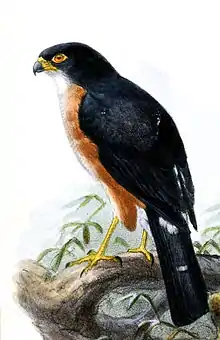Red-thighed sparrowhawk
The red-thighed sparrowhawk (Accipiter erythropus), alternatively known as the red-legged sparrowhawk or western little sparrowhawk, is a species of sparrowhawk in the family Accipitridae from western and northern central Africa.
| Red-thighed sparrowhawk | |
|---|---|
 | |
| Scientific classification | |
| Domain: | Eukaryota |
| Kingdom: | Animalia |
| Phylum: | Chordata |
| Clade: | Dinosauria |
| Class: | Aves |
| Order: | Accipitriformes |
| Family: | Accipitridae |
| Genus: | Accipiter |
| Species: | A. erythropus |
| Binomial name | |
| Accipiter erythropus (Hartlaub, 1855) | |
| Subspecies[2] | |
| |
| Synonyms[3] | |
|
Nisus erythropus Hartlaub, 1855 | |
Description
A very small, dove-sized sparrowhawk with a distinctive tail pattern. The red-thighed sparrowhawk is sexually dimorphic, the males of the nominate subspecies having very dark grey upperparts with a white crescent on the lower rump which is conspicuous in flight, as are three white broken tail bars on the dark grey tail. In contrast to the blackish cheeks the throat is white with the rest of the underparts pinkish white. The vermilion eye is surrounded by a red eye ring, the cere is orange red and the legs are bright orange yellow. Males of the subspecies A.e. zenkeri have deep rufous underparts and more obvious white spots on the tail. Females are much bigger than the males, with browner upperparts and a more brownish orange eye. Juveniles normally have the underparts barred with brown, sometimes up to the breast. The body length is 23–28 cm (9.1–11.0 in) and the wingspan is 40 cm (16 in).[4]
Distribution and subspecies
There are currently two recognised subspecies of red-thighed sparrowhawk.[3]
Habitat
The red-thighed sparrowhawk is found in lowland primary rainforest, along the forest edges and in clearings, as well as in older secondary forest.[5]
Habits
The red-thighed sparrowhawk is a secretive and crepuscular species that spends most of the day perched in the interior of the forest.[6] Its main prey is small birds up to the size of pigeons as well as lizards, amphibians, and insects. Prey is captured in quick dashes from a perch in the forest understory. This species often hunts co-operatively in pairs to harass mixed-species bird flocks.[7]
The breeding behaviour is little known but it does build a small stick nest in the fork of a tree, the only record being a family of five recorded in Liberia in December 1996.[5]
References
- BirdLife International (2016). "Accipiter erythropus". IUCN Red List of Threatened Species. 2016: e.T22695576A93516770. doi:10.2305/IUCN.UK.2016-3.RLTS.T22695576A93516770.en. Retrieved 17 November 2021.
- Gill F, D Donsker & P Rasmussen (Eds). 2020. IOC World Bird List (v10.2). doi : 10.14344/IOC.ML.10.2.
- "Red-thighed Sparrowhawk Accipiter erythropus (Hartlaub, 1855)". Avibase. Denis Lepage. Retrieved 27 October 2016.
- Ferguson-Lees, James; Christie, David A. (2001). Raptors of the World. Christopher Helm. p. 381. ISBN 0-7136-8026-1.
- "Red-thighed Sparrowhawk Accipiter erythropus". The Peregrine Fund. Retrieved 27 October 2016.
- "Profile Red-thighed Sparrowhawk". Raptors of the World. Avibirds. Retrieved 27 October 2016.
- "Red-thighed Sparrowhawk (Accipiter erythropus)". Planet of Birds. Retrieved 27 October 2016.
